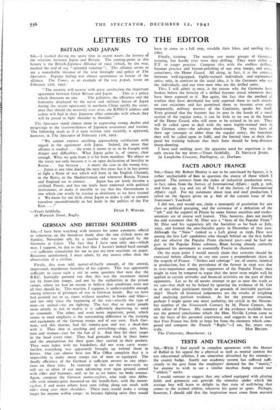FACTS ABOUT FRANCE
Snt,—Since Mr. Robert Hervey is not to be convinced by figures, it is rather uncharitable of him to question the source of those which I quoted. The extracts from the index of industrial production were, in fact, taken from the Survey of International Affairs : 1936, p. 208, and from pp. 114 and 121 of Vol. I of the Survey of International Affairs: 1938. For my statement about iron and steel production, I relied on the figures given on p. 896 of the current issue of the Statesman's Yearbook.
I did not, and would not, claim a monopoly of patriotism for any class or political grouping, and the existence of a defeatism of the " left " and the support of Petain by some former socialists and trades- unionists are of course well known. This, however, does not justify the odd statement that M. Deat was a " hero of the Popular Front." M. Deat and his supporters left the Socialists as far back as July, 1933, and formed the neo-Socialist party in December of that year. Although the " Neos " ranked as a Left group in 1936, Deat was among the few Left candidates who though behind on the first ballot did not observe the Popular Front electoral pact—and he had no part in the Popular Front cabinets, Blum having already correctly diagnosed his movement as essentially Fascist in character.
On the main point I would merely claim that restraint should be exercised before allowing to any one cause a preponderant share in the tragedy of France. " Strikes and sabotage " are, of course, inimical to production, but if the prevalence of the former in 1936 was due to over-impatience among the supporters of the Popular Front, they might in turn be tempted to argue that the latter term might well be applied to certain attitudes and financial activities on the part of their opponents. Let us by all means attempt to get as near the truth as we can—but shall we be helped by ignoring the evidence of M. Cot or of any other participant merely on grounds of inevitable partisan- ship? Nearly all historical judgements are the results of weighing and analysing partisan evidence. As for the present situation, perhaps I might quote one more authority, the article in the Novem- ber number of the Nineteenth Century by M. Pierre Comert, the able editor of France. His summary of the evidence Available bears out the general conclusions which the Hon. Neville Lytton came to on the basis of his personal experience, and suggests to me at least that Free France has little to hope for from the elements which com- posed and compose the French "Right."—I am, Sir, yours very truly, MAX BELOFF. The University, Manchester, 13.


























 Previous page
Previous page